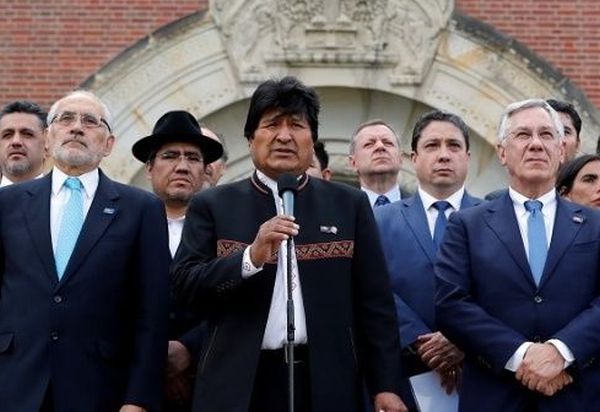
Bolivian President Evo Morales gave a press release shortly after the ruling and vowed to continue the fight for sovereign access to the Pacific Ocean
The International Court of Justice in The Hague Monday delivered its ruling on the dispute between Bolivia and neighbor Chile on access to the Pacific Ocean in which the court said that Chile “has no obligation to negotiate with Bolivia” over the matter.
With 12 votes against three, the United Nations court concluded that there is no such obligation.
Abdulqawi Ahmed Yusuf, president of the ICJ, opened the session by reading the preliminary considerations of the ruling on the contentious “obligation to negotiate” petition filed by Bolivia against Chile.
He also presented Bolivia’s eight legal arguments as the bases for filing the claim at the court, and also for the bases of Chile’s defense.
Bolivian President Evo Morales gave a press release shortly after the ruling and vowed to continue the fight for sovereign access to the Pacific Ocean. “I would like to take this opportunity. Bolivia is never going to give up its prosecution. The Bolivian people know, the world knows, that because of an invasion, we have been denied access to the Pacific Ocean.”
Chile’s President Pinera did not rule out further discussion, but said Morales’ application to the ICJ had meant the two nations had lost “five years in healthy and necessary relations”.
“The demand by Bolivia’s government had no foundation, neither historical, political or legal, and that is why it was categorically rejected,” he said.
A day ahead of the ruling, Morales expressed hopeful sentiment for a favorable ruling saying that Bolivia’s return to the sea was “inevitable” ahead of a World Court ruling on Bolivia’s claim that Chile has ducked a legal obligation to discuss the landlocked country’s access to the sea.
Morales made the comments during a news conference on Saturday just moments before boarding a flight to The Hague where he attended the verdict declaration session.
The conflict over the maritime boundaries between Bolivia and Chile began in 1828 when the Chilean Constitution established that its territory reached the depopulated sector of Atacama, a declaration that ended with the invasion of the place in 1879. Bolivia lost 400 kilometers of coast and 120,000 square kilometers of territory.
The lawsuit filed in April 2013 called for sovereign access to the Pacific Ocean that Bolivia lost by force 136 years ago when its port of Antofagasta was invaded. In September 2015, the Court of The Hague rejected the Chilean request to declare itself incompetent and kept analyzing the positions of the parties involved.
 Escambray ENGLISH EDITION
Escambray ENGLISH EDITION





Escambray reserves the right to publish comments.